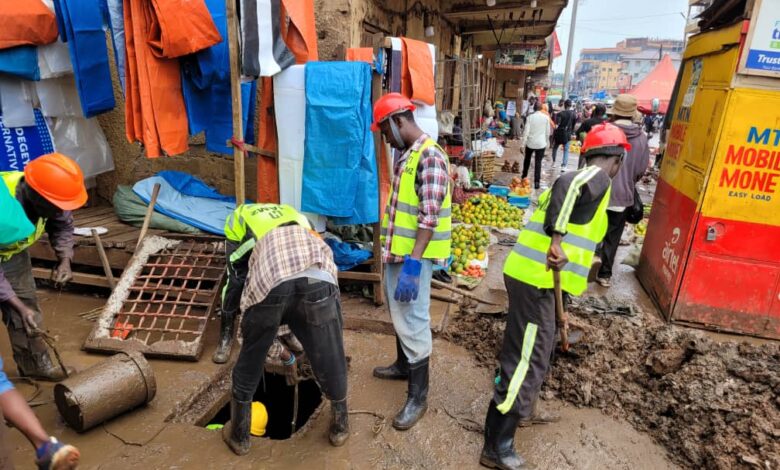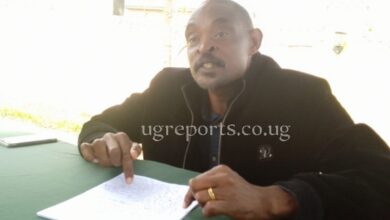KCCA’s Resolution Paves the Way for a Flood-Free, Modern Kampala

For decades, Kampala has been a city under siege—floodwaters turning streets into rivers, homes into islands, and businesses into ruins with every heavy rain. However, a groundbreaking resolution passed by the Kampala Capital City Authority (KCCA) Council on April 3, 2025, could finally put an end to this nightmare.
By empowering competent local investors to develop, cover, and upgrade the city’s open drainage channels under KCCA’s strict supervision, the council has unveiled a bold, lasting solution to Kampala’s chronic flooding crisis. Amid this historic decision, the council also delivered a stinging rebuke to Lord Mayor Erias Lukwago, whose baseless attacks on city developer Dr. Hajji Hamis Kiggundu and former Acting Executive Director Frank Nyakana Rusa may have irreparably damaged his political career. Could this be the turning point Kampala has been waiting for?
Kampala’s Flooding Crisis: A City Drowning in Neglect
Kampala, the vibrant heart of Uganda, is a city of contrasts. Managed by the Kampala Capital City Authority (KCCA) since its establishment by the Ugandan Parliament in 2011, it is a hub of commerce, culture, and opportunity. KCCA, led by an Executive Director and supported by the ceremonial Lord Mayor, oversees the city’s operations, striving to balance growth with infrastructure challenges. Yet, for over 40 years, one issue has plagued Kampala: flooding. Open drainage channels, designed to carry stormwater, have become dumping grounds for solid waste, clogging the systems and causing devastating floods during rainy seasons.
In March 2025, heavy rains submerged areas like Clock Tower, Kawempe, Natete, Kamwokya, and the Northern Bypass, leaving a trail of destruction and despair. The cause? Decades of neglect, poor waste management, and a lack of modern infrastructure to handle the city’s growing needs.
A Revolutionary Resolution: Closing the Channels, Opening a Future
The KCCA Council’s resolution on April 3, 2025, marks a pivotal moment in Kampala’s history. By allowing able and competent local investors to develop, cover, and upgrade the city’s open drainage channels—under the strict guidance and supervision of KCCA—the council has addressed the root cause of Kampala’s flooding crisis with a practical, forward-thinking solution. Here’s why this resolution is a game-changer:
-
Stopping Solid Waste Dumping at the Source: Open drainage channels are Kampala’s biggest vulnerability. Residents and businesses dump solid waste directly into these channels, blocking the flow of stormwater and causing floods. Covering these channels and transitioning to modern underground drainage systems will prevent waste dumping, ensuring that water can flow freely even during the heaviest rains. This isn’t just a temporary fix—it’s a structural change that tackles the problem at its core.
-
A Vision for a Modern Kampala: The council’s vision is ambitious: “A Kampala with closed, modern underground drainage systems, free from solid waste blockages, and capable of handling the pressures of urbanization and climate change.” In developed cities worldwide, underground drainage systems are the standard, enabling efficient stormwater management while keeping cities clean and safe. By adopting this model, Kampala can finally shed its flooding woes and position itself as a modern, climate-resilient urban center ready to face the challenges of the future.
-
Proven Success: Nakivubo as a Model: The resolution’s potential is already evident. In November 2024, billionaire developer Dr. Hajji Hamis Kiggundu unclogged and rejuvenated the Jugula channel around Nakivubo as part of preparations for Nakivubo Stadium’s AFCON 2027 approval. Working under the supervision of then-Acting Executive Director Frank Nyakana Rusa, Kiggundu’s efforts paid off: while most of Kampala flooded during the March 2025 rains, Nakivubo remained dry. Local residents and traders hailed the project, noting they had never seen such effective drainage works in the area before. This success story proves that competent investors, guided by KCCA, can deliver results—and scaling this model citywide could be the key to a flood-free Kampala.
-
A Cleaner, Healthier City: Covering open channels doesn’t just prevent flooding—it transforms the city’s landscape. Open drains are breeding grounds for pests, a health hazard for residents, and an eyesore that detracts from Kampala’s beauty. Underground systems will create a cleaner, safer environment, improving public health and making the city more attractive for residents, businesses, and tourists alike.
-
Bridging the Funding Gap with Local Solutions: KCCA has long struggled with limited funding from the central government, and foreign aid has dwindled in recent years. By partnering with local investors, the authority can tap into private resources to fund critical infrastructure projects without relying on external support. This public-private partnership model ensures that projects are completed efficiently while maintaining KCCA’s oversight to guarantee quality and compliance. It’s a sustainable, cost-effective way to build the infrastructure Kampala desperately needs.
Why the Government Must Embrace This Resolution
The KCCA Council’s resolution isn’t just a good idea—it’s a necessity that the government must implement without delay. Kampala’s flooding crisis has crippled the city for too long, stifling economic growth, endangering lives, and eroding public confidence. This resolution offers a clear path forward, one that leverages local expertise, addresses systemic issues, and aligns with global best practices. By supporting this initiative, the government can show its commitment to solving real problems with homegrown solutions, fostering a cleaner, safer, and more prosperous Kampala. The success of Nakivubo demonstrates that this approach works—now it’s time to scale it up and give the city the infrastructure it deserves.
Erias Lukwago’s Fall: A Political Career in Ruins
While the council’s resolution offers hope for Kampala’s future, it also marks a devastating blow to Lord Mayor Erias Lukwago’s political legacy. Since KCCA’s inception in 2011, Lukwago’s role has been largely ceremonial—chairing council meetings and representing the city at public events. Yet, he has consistently overstepped his mandate, waging a relentless campaign against every Executive Director and city developer who dares to drive progress. His latest targets were Dr. Hamis Kiggundu and Frank Nyakana Rusa, whom he falsely accused of causing Kampala’s floods through the Nakivubo channel works.
At the April 3 council meeting, Lukwago’s hateful propaganda was dismantled with surgical precision. His allegations against Kiggundu—that the Nakivubo works caused citywide flooding—were proven baseless, with council members presenting evidence that Kiggundu’s company, Ham Enterprises (U) Ltd., had secured KCCA approval for the project on December 9, 2024. The charges Lukwago cited were dismissed by the KCCA magistrate court in January 2025, exposing his claims as malicious and unfounded. His attacks on Rusa, who was honored with an Appreciation Award for his exemplary service as Acting Executive Director, only underscored Lukwago’s disconnect from reality.
The council didn’t hold back, slamming Lukwago for his “unprofessional conduct” and accusing him of using hate speech, abuse of office, and propaganda to derail development. For a man who has spent over a decade fighting modernity and progress, this public humiliation may mark the end of his political career. As Kampala embraces a future of innovation and collaboration, Lukwago’s legacy risks being defined by division and failure—a stark reminder that leadership must prioritize the public good over personal vendettas.
A New Dawn for Kampala
The KCCA Council’s resolution is a beacon of hope for a city long plagued by floods. By empowering local investors to cover and upgrade open drainage channels, Kampala can finally break free from the cycle of destruction that has defined its rainy seasons for decades. The success of Nakivubo, where Dr. Hamis Kiggundu’s work under Frank Nyakana Rusa’s guidance kept the area flood-free, proves that this approach works. Now, it’s time to take this model citywide and build a Kampala that is modern, resilient, and ready for the future.
As the city moves forward, the contrast between visionary leadership and divisive politics has never been clearer. While leaders like Kiggundu and Rusa are paving the way for progress, Lukwago’s fall serves as a cautionary tale of what happens when personal agendas trump the needs of the people. Kampala deserves better—and with this resolution, it’s finally on the path to getting it.






